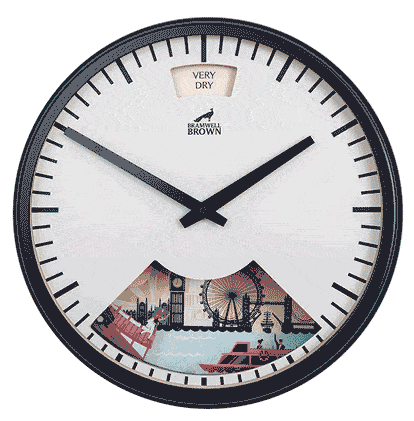The Bramwell Brown Blog
What is a Radio-Controlled Wall Clock?

Not to be confused with a clock radio, which might be your alarm clock, the radio clock is controlled by a radio transmitter that synchronizes the time with a highly accurate time keeper like an atomic clock. For those wanting the most precise timepiece, a radio-controlled clock is your best bet.
Atomic clocks around the world keep time by using the vibrations of a Cesium 133 atom. The amount of vibrations is a constant that we use to measure the passing of one second, and it’s kept in check by a feedback detector that will help correct any frequencies that are off. It’s very similar to quartz clocks, which most of us have, but more accurate because it’s not affected by outside factors like temperature. The accuracy of an atomic clock is astounding because it won’t be off by more than two nanoseconds, if even that.

There are other types of atomic clocks, aside from the very popular Cesium-based one. Some use gases like hydrogen or rubidium, but these elements can be hard to contain in their gaseous form and are therefore less used. The atomic clock works through being heated and cooled and measuring the excitation of the atoms.
The time from the atomic clock is then broadcast by low-frequency radio waves that are stable enough to travel 1000 miles from its origin and follow the curvature of the Earth. The radio-controlled clock picks up these signals with its antennae and can keep precision time with the world’s most accurate clocks. Most stations that broadcast the time will have their own formatted time code, meaning that if you were to take a British clock to Canada, it would likely have difficulties decoding the time from the station nearby. The frequencies that radio stations use for broadcasting the time can also vary, with countries like Russia broadcasting at 25 kHz to parts of the United States broadcasting at 25 MHz, and others using frequencies in between.
Though you can manually set a radio-controlled clock, the adjustments from its incoming radio messages keep it running smoothly and in sync with a more accurate atomic clock. A radio clock is more than just a time counter, adding seconds and minutes to the time you set it—it’s a timekeeper that you can rely on. Radio-controlled clocks usually synchronise their time once a day, and a few will check every few hours to ensure that their time is correct. This means that these clocks are never off more than half a second, which is an important feature in a clock.
There are also radio-controlled watches, since all that is needed is a radio transmitter and an antennae to receive the transmitted signal. However, it helps to keep in mind that your watch (and clock) are usually only in sync with a time code that is transmitted from the a nearby radio transmitter and when you’re travelling abroad, the watch may not sync correctly especially if it is tuned to a different frequency than what is being broadcast where you are. Watches and clocks that do sync up to radio waves no matter where they are typically use Global Positioning Satellite (GPS).
For the best performance of a radio-controlled clock, the ideal spot for it is away from devices that may interfere with the radio waves, like the television or computer. Strong electrical activity like a wild storm can make the clock less accurate until it passes and you’ll always want to ensure that you’ve got new batteries installed.
Though a clock can receive radio frequencies almost anywhere with minor disruption, they’ll pick up their time code easier when close to a window to minimize barriers to the incoming radio waves. Since most atomic clocks will account for Daylight Savings, you may want to deactivate that function by pushing the DST button so your time is still accurate if you’re living not in a DST region.
Some clocks even use multiple sources in order to display the most accurate time. This feature makes these clocks reliable and trustworthy, and can be a great clock to have in your home in order to base the rest of your timekeepers on. So for those who travel frequently, this is the best choice of clock that you can make. A clock can rely on GPS information and radio frequencies to keep time. Though you may have to adjust manually for a different timezone, you can still ensure that your timepiece is carrying the most correct time you can get while away from home.
One of the problems solved by the atomic clock is that we no longer rely on the macro world of the sun and Earth to keep time, as we would have before clocks. However, with a more accurate atomic clock comes the fact that it doesn’t account for the hiccups of the Earth’s rotation that slows or speeds rather than maintains a constant and then our atomic clocks need to be adjusted for our imperfect Earth. Otherwise, our atomic clocks would keep track of a time that no longer makes sense and is out of step with our external environment.
Radio-controlled clocks come in all forms, so wherever you need an accurate timepiece, you’re not limited to your particular style. Wall clocks are a classic choice, especially for an office space where time is an important part of planning your day, but there are also desk clocks and watches that are atomically-coordinated. Whatever your need, you can stay on time with a radio-controlled clock.
References:
2. Radio Clock, Wikipedia article
3. Radio controlled and atomic clocks by Chris Woodford





